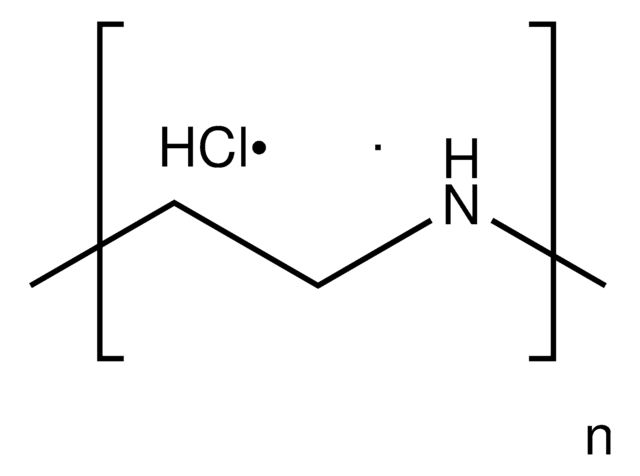929867
Linear polyethylenimine-block-poly(ethylene glycol)
PEG average Mn 2,000, PEI average Mn 30,000
Synonym(s):
PEG-b-PEI, PEG-PEI, Poly(ethylene glycol)-block-polyethylenimine
Sign Into View Organizational & Contract Pricing
All Photos(1)
About This Item
Linear Formula:
CH3(C2H4O)n(C2H5N)mOH
UNSPSC Code:
12162002
NACRES:
NA.25
Recommended Products
form
powder or solid
Quality Level
mol wt
PEG Mn 2000 Da
PEG average Mn 2,000
PEI Mn 30000 Da
PEI average Mn 30,000
color
white to pale yellow
storage temp.
2-8°C
Looking for similar products? Visit Product Comparison Guide
General description
Linear polyethylenimine-block-poly(ethylene glycol) (PEG-b-PEI) is a block copolymer of cationic poly(ethylene imine) (PEI) and hydrophilic poly(ethylene glycol) (PEG). PEI is one of the most commonly used cationic polymers for gene delivery applications and PEG improves nucleic acid delivery by producing a stealth barrier.
Application
Due to their low immunogenicity profiles, polymeric non-viral vectors have shown promise in advancing the treatment of many severe genetic and acquired diseases via gene therapy.
Features and Benefits
Copolymers of PEI and hydrophilic poly(ethylene glycol) have been designed to provide a stealth-like shield around polymer/DNA complexes, reducing nonspecific interactions, inhibiting activation of the reticuloendothelial system, and prolonging the half-life of the complexes in the blood.
Storage Class Code
11 - Combustible Solids
WGK
WGK 3
Flash Point(F)
Not applicable
Flash Point(C)
Not applicable
Choose from one of the most recent versions:
Certificates of Analysis (COA)
Lot/Batch Number
Sorry, we don't have COAs for this product available online at this time.
If you need assistance, please contact Customer Support.
Already Own This Product?
Find documentation for the products that you have recently purchased in the Document Library.
Pallab Banerjee et al.
Bioconjugate chemistry, 17(1), 125-131 (2006-01-19)
A block copolymer of a hyperbranched poly(ethylene glycol)-like core and linear polyethylenimine (HBP) was synthesized by a facile synthetic route that included (1) a single-step cationic copolymerization of diepoxy and polyhydroxyl monomers, (2) derivatization of hydroxyl groups of the core
Our team of scientists has experience in all areas of research including Life Science, Material Science, Chemical Synthesis, Chromatography, Analytical and many others.
Contact Technical Service




